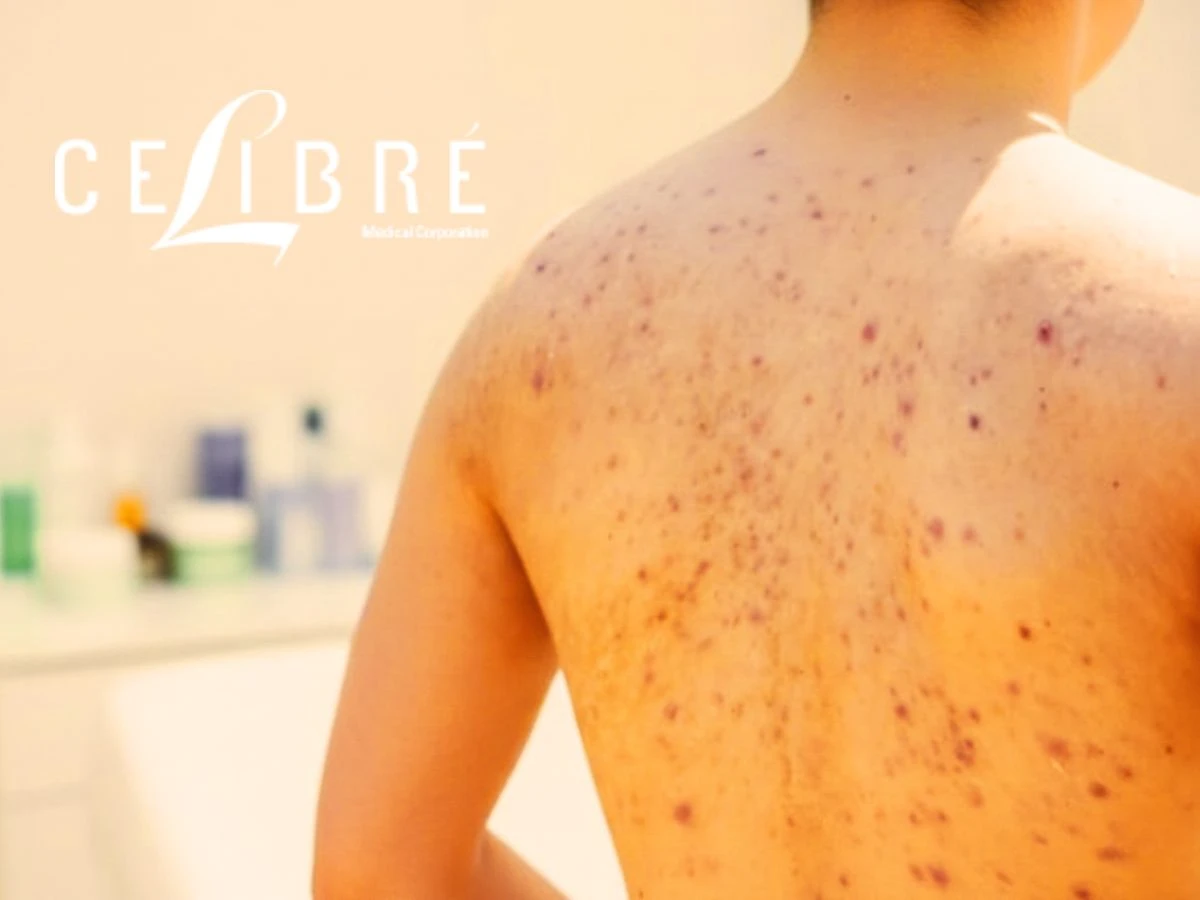Dark spots on the body are a common concern for many of our patients. The skin develops these spots – hyperpigmentation, sunspots or age spots – over time, and they can be present on any part of the body including arms, legs, back or chest. The spots are often harmless sun damage, but they create visible changes to your skin’s appearance. The good news is that there are several ways to remove or reduce the visibility of these spots and even prevent new ones from forming.

Common Causes of Dark Spots on the Body
Understanding why dark spots appear is the first step in managing them effectively. The sun is the primary reason we see brown spots on the body develop. The skin produces melanin in response to ultraviolet (UV) radiation which results in the development of dark patches that may become more noticeable over time. Patients who spend a lot of time outdoors or frequently get sunburned may notice more of these spots.
The development of dark spots on the face can occur as a result of hormonal shifts which primarily affect female individuals. Pregnancy and birth control methods together with other hormonal changes lead to blotchy brown patches on the cheeks, upper lip or forehead (Melasma). Skin injuries together with inflammation from acne and cuts and burns may result in dark spots that develop during the healing process. This type of post-inflammatory hyperpigmentation is typical for medium and darker skin tones.
Preventive Measures
Avoiding dark spots before they develop is the best way to deal with them. We advise our patients to protect their skin from the sun every day to achieve long term skin health and avoid the development of brown spots. Your body benefits from the use of broad-spectrum sunscreen application. We advise at least 50 spf, which protects against UV rays that cause pigmentation changes. Protective clothing, including long sleeves, hats and UV-protective fabrics serve as a physical shield against sunlight exposure.
Our patients may use a mild skin care routine to maintain their skin health. The skin can develop dark spots in response to irritation, which can happen when they use rough scrubbing methods or harsh skin products. Moisturizing the skin with gentle cleansers helps maintain skin health while preventing the formation of new spots.
Effective Treatments to Reduce Dark Spots
Multiple treatment options exist for body dark spot removal which include topical solutions and professional medical interventions.

Topical Treatments
Topical creams and serums are often the first choice for many of our patients when it comes to getting rid of body spots. Vitamin C products are popular because they have the ability to brighten the skin. Although Vit C can help brighten the skin, it does not get rid of age spots or other forms of hyperpigmentation.
Retin A and retinol products are a second option that many commonly choose. The products help skin cells to renew by causing dead skin cells to flake off the surface. This can help with dark blemishes or darkening that occurs after an injury. Not by directly getting rid of pigment but because increasing cell turnover helps patients decrease the time it takes for that pigment to come to the surface because of the increased rate of skin renewal.
Professional Treatments
Professional treatments are the best solution for treating dark spots on the body. Laser therapy is a superior treatment option for age spots and also works to speed up the process of getting rid of post traumatic hyperpigmentation such as a dark spot created by a scrape or fall. The lasers target dark pigmentation directly to break down melanin particles. With sun spots, the outer layer of skin gets removed when the laser heats the pigment in the spot causing the destruction of colored skin cells. The body then replaces those colored cells with new ones that have the skin’s natural tone. Hydroquinone is a medicated bleaching agent that can fade hyperpigmentation associated with acne scars or other trauma related dark scars. Chemical peels can be used in certain situations but do not achieve superior results to lasers or hydroquinone bleaching products.
Combination Approaches
Many of our patients find that the best results are when we combine topical hydroquinone with laser treatments. Using creams or serums at home alongside treatments like lasers or chemical peels can enhance overall improvement, leading to a more uniform skin tone.
Lifestyle and Home Care Tips
Lifestyle habits play an essential role in skin health and avoiding skin pigmentation problems. Regular exfoliation with gentle chemical exfoliants such as glycolic acid and soft physical scrubs enables the removal of dead skin cells, which contributes to the gradual reduction of pigmentation.
Choosing the Best Approach
Finding the best treatment for dark spots on your body requires assessment of your skin type, the severity and type of pigmentation as well as your goals. The treatment of mild dark spots may be appropriate for topical solutions such as hydroquinone but deeper, darker and more resistant pigmentation may require laser treatments. The combination of a daily skin care routine combined with professional treatments, leads to quicker and more dramatic results. Consistency is key—regular medical treatments and adherence to preventive measures lead to lasting improvement.
Conclusion
Dark spots on the body are a common concern, but they can be effectively treated and managed using the right approaches. Skin tone becomes more uniform and brighter through preventive measures and topical treatments while professional treatments like lasers can get rid of more stubborn body pigment.

